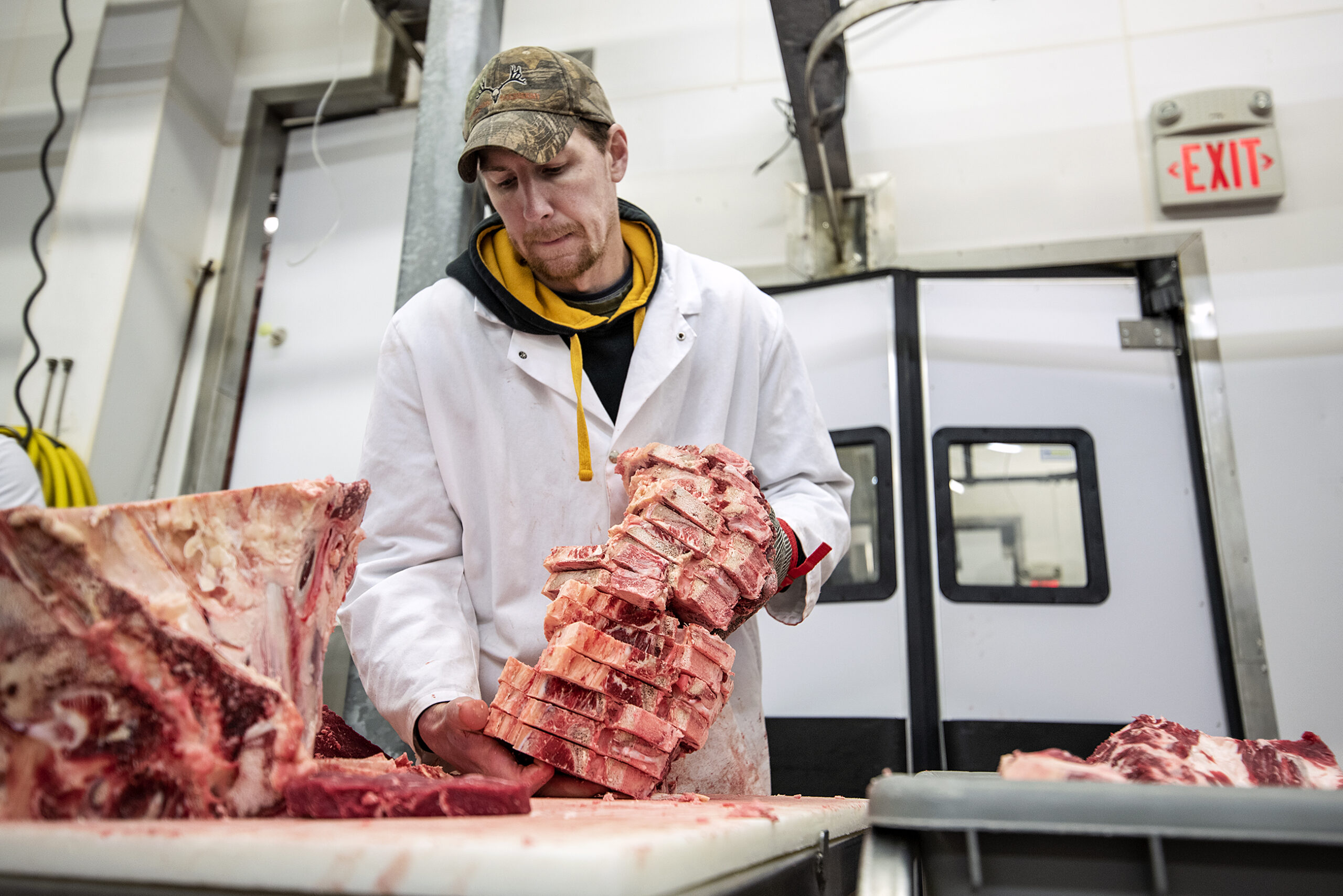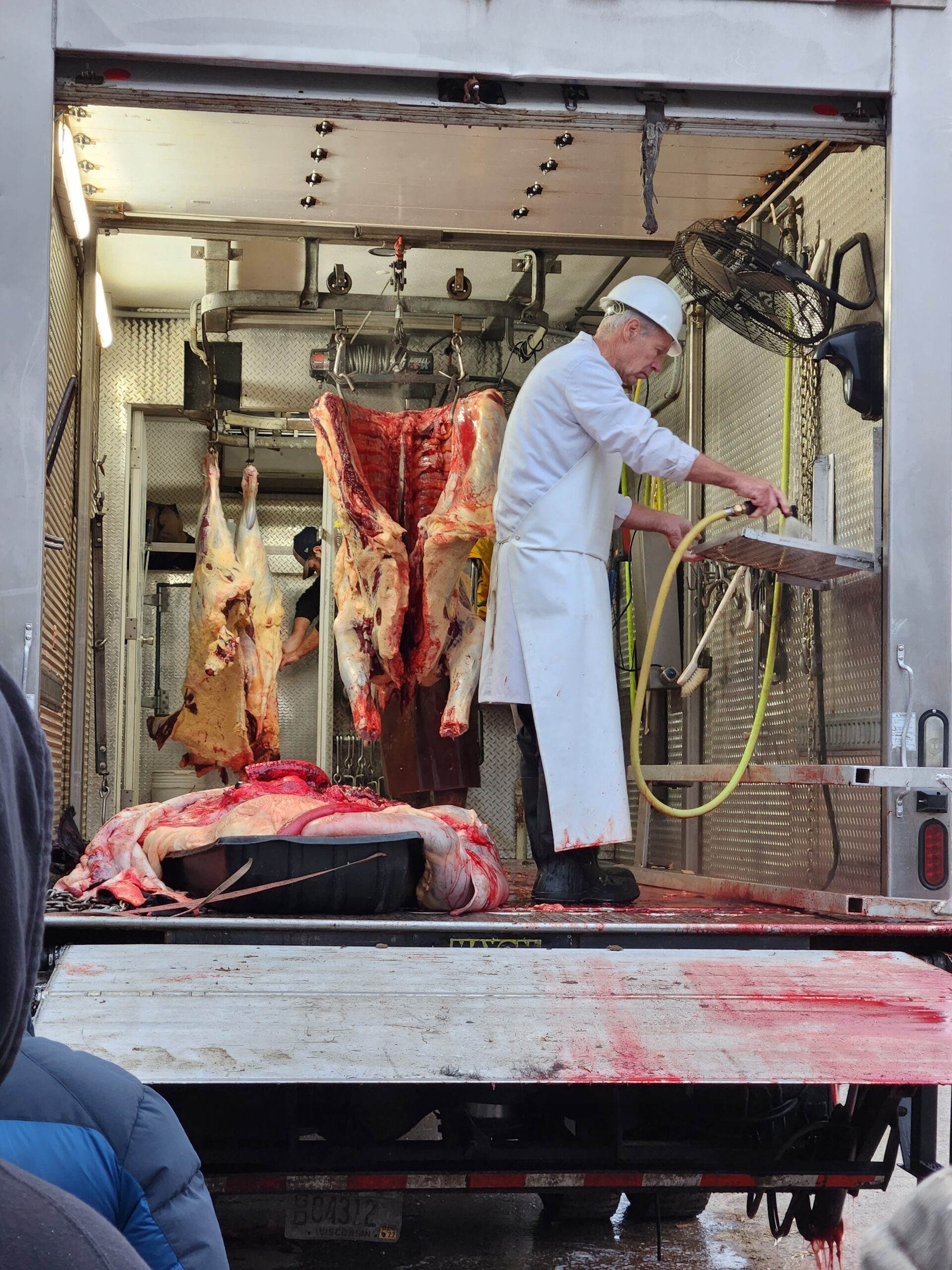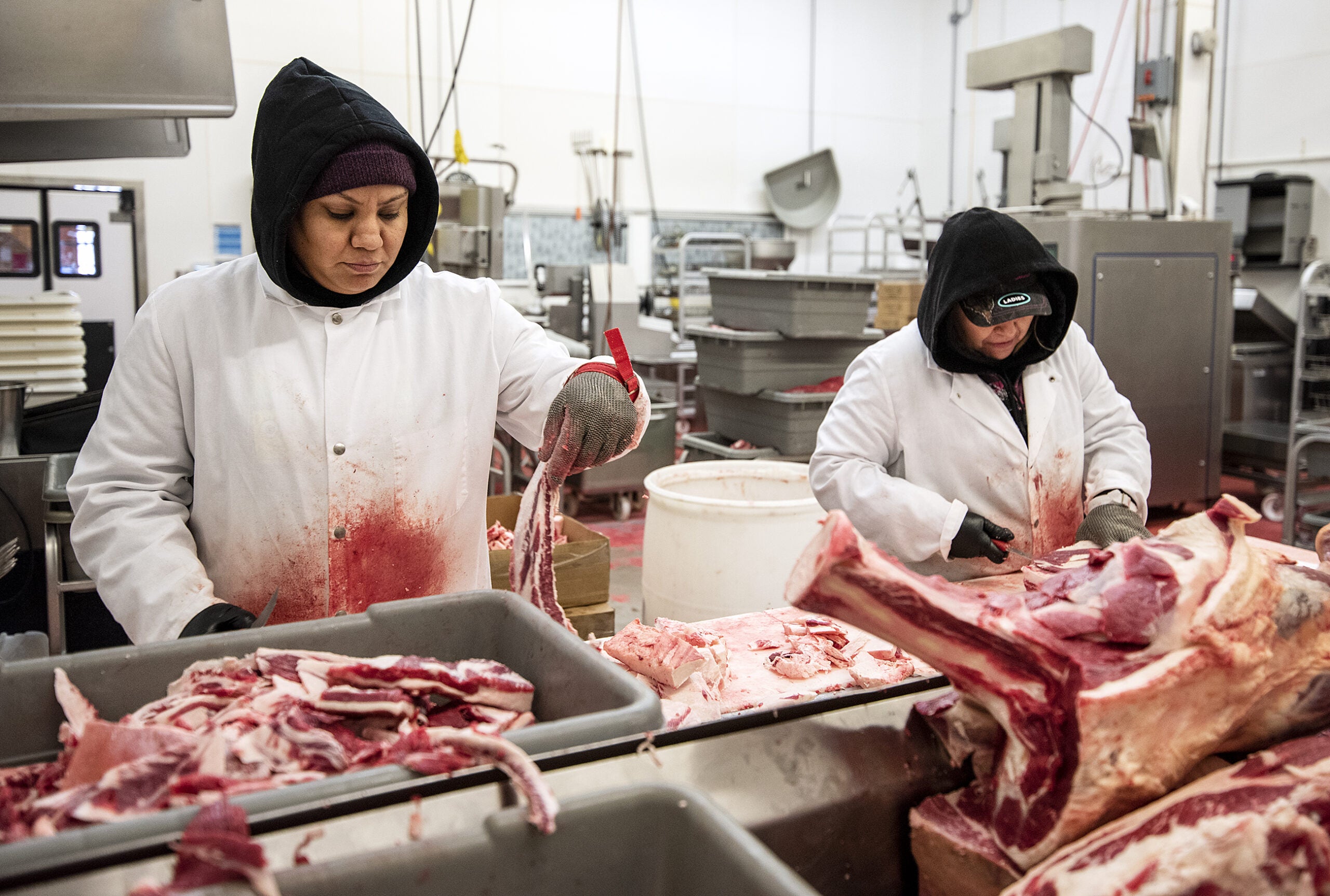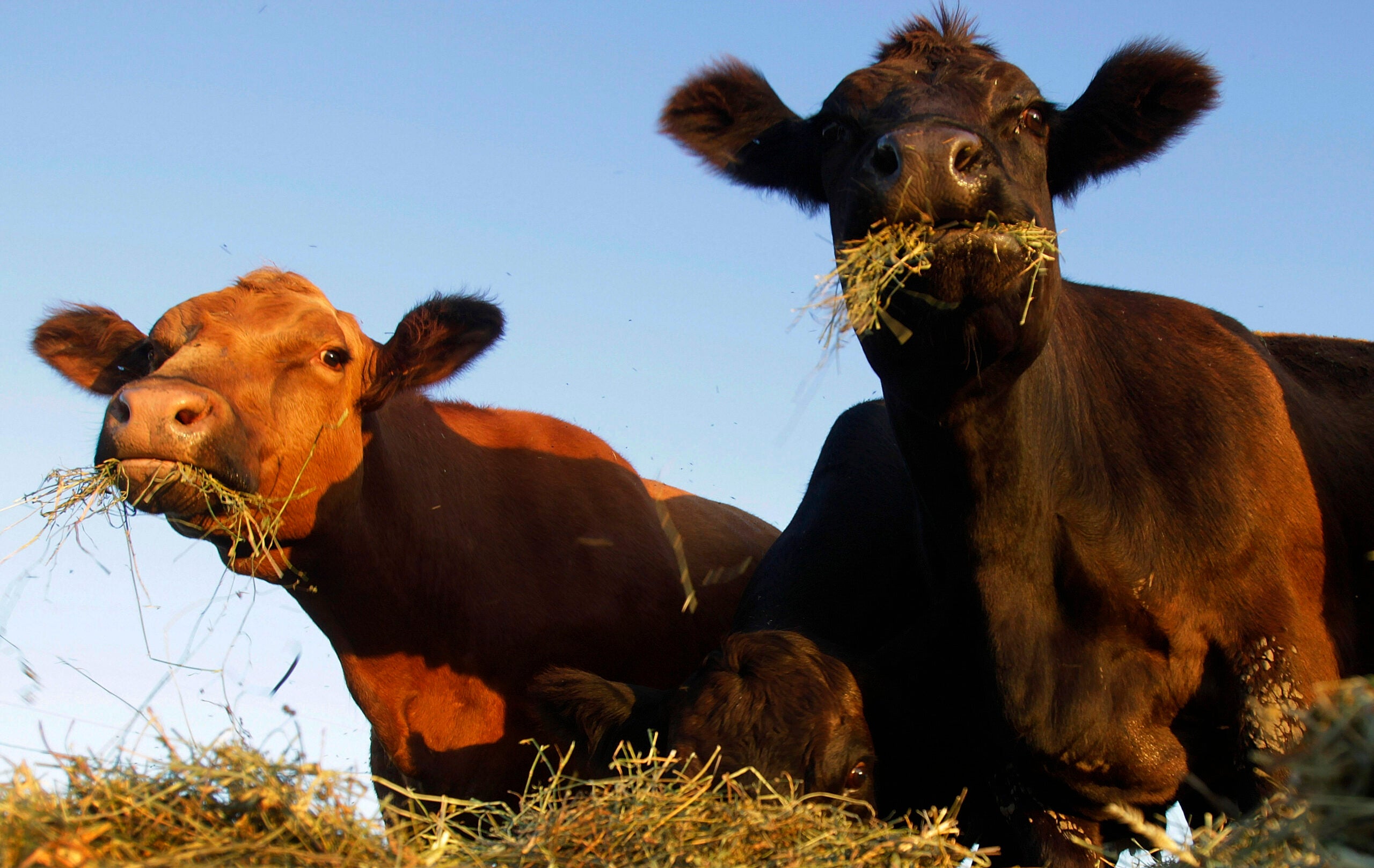Small farmers and meat processors are calling for more state support to address a shortage of skilled workers and inspectors that have created delays and challenges with processing animals.
Some meat processors say they have been booked solid for up to two years or more as the COVID-19 pandemic caused shutdowns at the nation’s largest meatpacking plants, spurring demand for local and regional processors.
Jake Sailer owns Sailer’s Food Market & Meat Processing in Elmwood. Sailer, who is also president of the Wisconsin Association of Meat Processors, said they’re likely booked out for the next 22 months. He said at one point, they were booked out for 3 years.
News with a little more humanity
WPR’s “Wisconsin Today” newsletter keeps you connected to the state you love without feeling overwhelmed. No paywall. No agenda. No corporate filter.
“We were actually booking animals before they’re even born…and it’s kind of come around to the point now where we are getting caught up,” Sailer said.
The reason? Sailer said some processors are seeing cancelations for slaughter as customers are backing away from buying beef due to higher meat prices.
He urged buyers, farmers and processors to communicate about changes in advance to help reduce wait times for others. Despite cancelations, he said they’re still seeing higher demand than prior to the pandemic when wait times for scheduling animals for slaughter were around three to six months.

In far northwestern Wisconsin, leaders say there aren’t enough workers and businesses to serve the needs of smaller farmers and producers.
“Many of the local farmers travel great distances, and it makes it difficult to produce and sell livestock locally,” Bayfield County Administrator Mark Abeles-Allison said.
Carly Stephenson and her husband Tyler co-own Will o the Winds Farm in Washburn, which raises pastured pigs. She said it’s been a struggle to schedule their pigs for slaughter.
“I’m calling nine months out to create butcher appointments,” Stephenson said. “I have an approximate idea of how many hogs I’m hoping to raise, but some things fall through. Or we may end up with a couple more, and we just have to completely be reliant on what the butcher can fit in for us.”
Stephenson has been taking her pigs roughly two hours away by vehicle to Lake Haven Custom Meat Processing in Sturgeon Lake, Minnesota, for the last two seasons. The facility is certified by the state and U.S. Department of Agriculture or USDA. Any meat sold commercially must receive federal inspection if it’s crossing state lines unless it’s inspected by a state plant that participates in the USDA’s Cooperative Interstate Shipping Program.
Stephenson said their hogs often don’t grow to the anticipated size by their butcher date, meaning she’s sending smaller pigs to slaughter. That means they’re not making as much money from what they’re able to sell to customers, and customers may be unsatisfied if they’re seeking a certain quantity.

One of the biggest challenges facing meat processors is a shortage of skilled workers, according to Louis Muench, who owns Louie’s Finer Meats in Cumberland in northwestern Wisconsin. The business doesn’t slaughter animals, but it provides custom processing.
“It gets frustrating,” Muench said. “Your two highest priorities are having a high-quality product and having good customer service. And so, sometimes, if you’re short on employees, that’s when your customer service goes down. We’re doing the best we can, but it certainly makes it more difficult.”
He said some facilities are exploring automation to help the industry do more with the same number of employees. However, when meat processors slaughter animals, Muench noted a meat inspector must be present. He said that means some are working around the schedules of those inspectors.
Randy Romanski, secretary of the state Department of Agriculture, Trade, and Consumer Protection, said the state has about 60 meat inspectors. At the same time, he noted the state has around 500 meat processors. Of those, about 250 are state-inspected plants.
“We do need, as the state, to keep up with our responsibilities,” Romanski said. “If we don’t have adequate staff at DATCP to be there to inspect on days when harvest or processing is happening in a state-inspected plant, we’re slowing the industry down.”
The 2021-23 budget provided four additional meat inspectors at the state, but they were only approved as temporary positions. Gov. Tony Evers’ next two-year budget proposes to make those positions permanent.
In the last year, Evers has devoted $15 million in federal money under the American Rescue Plan Act to bolster support for the industry and talent development.
Under the next budget, the governor is reviving a proposal to provide $1 million each year for the state’s meat processor grant program, which supports processors looking to expand operations and capacity. The Legislature created the program under the current budget, but lawmakers scaled back funding to $200,000 annually.

Evers’ budget also proposes extending the meat talent development grant program with $1.2 million in funding next year. That program offers tuition assistance to students pursuing a career in meat processing, and it can also be used for developing meat processing curriculum at technical colleges and universities.
Romanski pointed to work with the University of Wisconsin-River Falls and UW-Platteville that provide more awareness of careers in the meat industry, as well as training opportunities at UW-Madison. He added that nine of the state’s 16 technical colleges are developing meat processing programs.
Deb Kutrieb, dean of skilled trades at Northwood Technical College, said they received a $241,000 grant to support education of workers for the industry. They’ve also received an additional $200,000 for a mobile processing unit that would travel to farms and slaughter animals on site while providing hands-on training to students. She said the unit could be utilized by farmers across the region where their four campuses are located in northwestern Wisconsin.
“Everyone needs employees in their industry, so they are very excited about getting this up and running,” Kutrieb said. “And so the discussion right now is what skills do we need to bring them into industry.”
She said they’re currently developing the curriculum with processors and hope to be up and running sometime this fall. The grant runs through December of next year.
Processors like Sailer hope similar efforts will get students interested in a career in meat processing.
“That’ll help relieve the pressure of labor (shortages) in these meat plants,” Sailer said. “Then, they will be able to do more.”
Wisconsin Public Radio, © Copyright 2025, Board of Regents of the University of Wisconsin System and Wisconsin Educational Communications Board.





